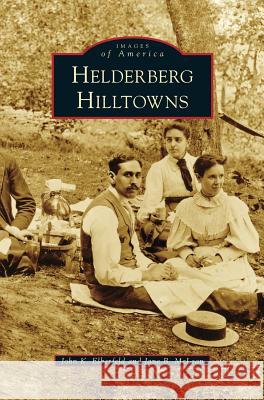Helderberg Hilltowns » książka
Helderberg Hilltowns
ISBN-13: 9781531662677 / Angielski / Twarda / 2012 / 130 str.
The early Dutch settlers in Albany called the hills to the west "Hellebergh," or "Clear Mountain." Little did they know of the rugged terrain that lay above the Helderberg Escarpment or of the hardy men and women who would one day tame that wilderness. Faced with thin soil and a harsh climate, the resourceful people of the Helderbergs established four towns: Berne, Knox, Rensselaerville, and Westerlo. The Hilltown farmers declared their independence from the feudal landlord system during the renowned anti-rent wars of the mid-1800s. As the agrarian economy faded, the enterprising Hilltowners used local resources in new ways to earn their livelihood. Landowners capitalized on the natural beauty of the region to attract tourists. Knox's cottage industry of wooden pillbox production brought it fame as the "Pillbox Capital of the World." Rensselaerville's Huyck Preserve created opportunities for the long-term study of biological systems. Helderberg Hilltowns takes the reader back to 1880 through 1950, a time of one-room schoolhouses, church socials, barn raisings, haying with draft horses, bobsledding parties, family reunions, and rocking chairs on the veranda.
The early Dutch settlers in Albany called the hills to the west "Hellebergh," or "Clear Mountain." Little did they know of the rugged terrain that lay above the Helderberg Escarpment or of the hardy men and women who would one day tame that wilderness. Faced with thin soil and a harsh climate, the resourceful people of the Helderbergs established four towns: Berne, Knox, Rensselaerville, and Westerlo. The Hilltown farmers declared their independence from the feudal landlord system during the renowned anti-rent wars of the mid-1800s. As the agrarian economy faded, the enterprising Hilltowners used local resources in new ways to earn their livelihood. Landowners capitalized on the natural beauty of the region to attract tourists. Knoxs cottage industry of wooden pillbox production brought it fame as the "Pillbox Capital of the World." Rensselaervilles Huyck Preserve created opportunities for the long-term study of biological systems. Helderberg Hilltowns takes the reader back to 1880 through 1950, a time of one-room schoolhouses, church socials, barn raisings, haying with draft horses, bobsledding parties, family reunions, and rocking chairs on the veranda.











